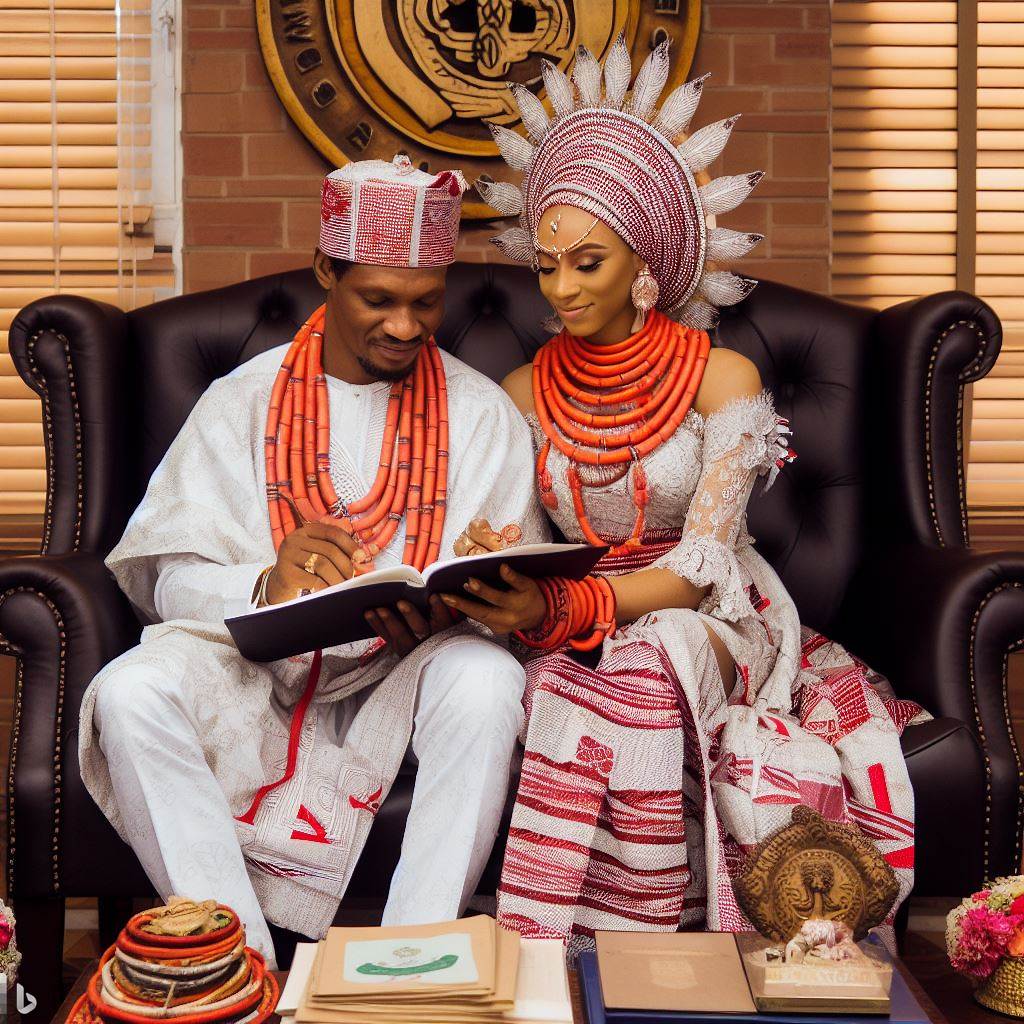Introduction to the Nigerian Marriage Registry Process
Getting married in Nigeria requires couples to go through the formal process of registering their marriage.
This process is known as the Nigerian Marriage Registry Process and it is essential for couples to understand and follow the legal procedures involved.
The marriage registry process entails a number of steps that need to be completed in order for the marriage to be recognized as legally binding.
Couples must first schedule an appointment with the marriage registry where they will be required to provide certain documents such as birth certificates, identification cards, and evidence of divorce or death if applicable.
It is crucial for couples to go through the proper legal procedure of the marriage registry process to ensure the validity of their marriage.
By following the correct steps, couples can avoid common mistakes that may result in their marriage not being legally recognized.
One of the key reasons for going through the proper legal procedure is to protect the rights and interests of both parties.
Registering the marriage provides a legal framework that safeguards the rights of each person, including issues related to inheritance, property rights, and spousal support.
In addition, going through the marriage registry process ensures that the marriage is recognized by the government and can be relied upon for official purposes such as obtaining passports, visas, or social security benefits.
It also grants couples legal protection in the event of a dispute or the dissolution of the marriage.
In fact, understanding and adhering to the Nigerian Marriage Registry Process is vital for couples to establish a legally recognized union.
By going through the proper legal procedure, couples can avoid common mistakes and ensure the protection of their rights and interests.
Lack of Proper Documentation
One of the most common mistakes in the Nigerian marriage registry process is the lack of proper documentation.
Couples often overlook or forget to gather the necessary documents, causing delays and frustrations in their marriage registration.
To ensure a smooth and efficient registry process, it is crucial to understand the required documents and gather them beforehand.
Required Documents for the Marriage Registry Process
Before proceeding with the marriage registry process, couples must gather the following essential documents:
- Proof of age: Couples need to provide valid identification documents such as birth certificates or national identity cards to prove their age.
- Valid identification: Both partners should possess valid identification documents, such as passports or driver’s licenses.
- Proof of marital status: If either partner was previously married, they must provide a divorce certificate or a death certificate of their former spouse.
- Sworn affidavit: Couples must obtain a sworn affidavit to confirm their single status and eligibility for marriage.
- Passport photographs: Recent colored passport-sized photographs of both partners are required for the marriage registry.
- Parental consent (if applicable): In cases where one or both partners are under the legal age of marriage, written consent from their parents or guardians is necessary.
- Proof of address: Couples should provide documents verifying their current residential address, such as utility bills or bank statements.
Common Overlooked or Forgotten Documents
Despite the importance of these documents, many couples often overlook or forget to gather them ahead of time.
The excitement and busy nature of wedding preparations can contribute to this oversight.
However, failing to gather the necessary documents can result in delays, rescheduling, and unnecessary stress.
It is crucial for couples to pay close attention to each required document and ensure they have obtained all of them.
Proper planning and diligent execution can save time and prevent unnecessary hurdles during the registry process.
A Checklist to Ensure Couples are Well-Prepared
To avoid the common mistake of lacking proper documentation, couples should use the following checklist to ensure they are well-prepared for the Nigerian marriage registry process:
- Verify the required documents: Research and confirm the exact documents needed for the marriage registry process in Nigeria.
- Start early: Begin gathering the necessary documents well in advance to allow sufficient time for any potential delays or complications.
- Create a checklist: Make a list of all required documents and check them off as you collect and organize them.
- Double-check and review: Before the scheduled marriage registry date, double-check that you have all the required documents and review them for accuracy.
- Organize and keep copies: Keep all the documents neatly organized in a folder and ensure you have both the original copies and photocopies.
- Seek professional assistance if needed: If you are unsure about any document requirements, consult with a legal professional or marriage registry official for guidance.
By following this checklist, couples can avoid the common mistake of lacking proper documentation and ensure a seamless and hassle-free marriage registry process in Nigeria.
Read: Understanding the Revocation of Citizenship in Nigeria
Failure to Understand the Timeline
The process of registering a marriage in Nigeria involves several crucial steps, and one common mistake couples make is failing to understand the timeline involved.
In this section, we will clarify the timeline for completing the marriage registry process, emphasize the importance of starting early, and advise on the consequences of not adhering to the timeline.
Understanding the Timeline
- Notification Period: In Nigeria, couples are required to give a 21-day notice to the registrar before the intended wedding date.
This is a legal requirement, and the notice must be submitted to the local government or area council where either the bride or groom resides. - Submission of Documents: Couples need to prepare the necessary documents well in advance.
These documents include birth certificates, statutory declaration of bachelorhood/spinsterhood, and an affidavit declaring their freedom to marry.
All documents must be submitted within the 21-day notice period. - Wedding Date: After the 21-day notice period, the couple can choose a wedding date that falls after the expiration of the notice period.
This gives ample time to plan the wedding ceremony.
Importance of Starting Early
- Compliance with the Law: Failing to adhere to the 21-day notice requirement can result in legal consequences.
It is essential to start early to avoid complications. - Planning: Starting early allows couples to plan their wedding without time constraints, ensuring that all details are taken care of meticulously.
Consequences of Not Adhering to the Timeline
- Legal Implications: Failure to adhere to the timeline may result in a delay or cancellation of the wedding.
This can be embarrassing and disappointing for couples. - Frustration: Rushing through the process due to a late start can lead to errors and oversights, causing unnecessary stress and frustration.
Basically, understanding and adhering to the timeline for the marriage registry process is crucial for a smooth and legally compliant wedding in Nigeria.
Starting early is not just a recommendation but a legal requirement that ensures a hassle-free marriage registration.
Couples should take this timeline seriously to avoid any unwanted complications or delays.
Read: Financial Implications of Marriage-Based Citizenship in Nigeria
Incomplete or Inaccurate Forms
Completing the necessary forms correctly is crucial to avoid delays and complications in the Nigerian marriage registry process.
Various forms that need to be filled out during the process
1. Marriage Declaration Form
This form requires basic information about both parties, such as their names, ages, occupations, and addresses.
It also requires the details of the intended marriage, including the date, time, and venue.
2. Affidavit of Bachelorhood/Spinsterhood
This affidavit confirms that both parties are single and eligible to marry.
It needs to be sworn before a commissioner for oaths or a notary public.
3. Marriage Affidavit
Both parties are required to sign this affidavit, affirming their consent to marry and stating that there are no legal impediments to the marriage.
4. Consent to Marriage
If one or both parties are under the age of 21, parental or guardian consent forms must be filled out and signed by the appropriate individuals.
Provide tips on how to correctly complete each form
- Ensure that all information provided is accurate and matches official documents.
- Double-check all spellings and details to avoid any mistakes or discrepancies.
- Fill out the forms neatly and legibly to prevent any misunderstandings or misinterpretations.
- Seek guidance from a legal professional or experienced individuals to ensure the forms are completed correctly.
Implications of submitting incomplete or inaccurate forms
Submitting incomplete or inaccurate forms can lead to significant delays in the marriage registry process.
The marriage registrar may reject the forms, requiring them to be re-submitted with correct information.
Missing or incorrect information can also raise doubts about the validity or eligibility of the marriage.
Inaccurate forms may result in the marriage being deemed null and void, requiring the couple to repeat the entire process.
Additionally, inconsistencies between the forms and official documents can cause legal complications and challenges in the future.
Properly completing and submitting the required forms is essential to ensure a smooth and efficient Nigerian marriage registry process.
Read: The Emotional Journey of Pursuing Citizenship by Marriage

Lack of Communication with the Registry Office
In the process of getting married in Nigeria, one common mistake that couples often make is not maintaining regular communication with the registry office.
This can lead to unnecessary delays, confusion, and even frustration.
Importance of Regular Communication with the Registry Office
Regular communication with the registry office is crucial for a smooth and hassle-free marriage registration process.
It ensures that couples stay informed about any updates or changes in the requirements or procedures.
By staying in touch with the registry office, couples can also receive valuable guidance and support throughout the process.
The registry office staff are experts in the marriage registration process, and they can provide helpful advice and answer any questions or concerns the couples may have.
Clarify Any Doubts or Concerns
Couples should take the opportunity to clarify any doubts or concerns they may have regarding the marriage registration process.
It’s essential to have a clear understanding of the requirements, necessary documents, and any additional steps that may be involved.
By addressing these concerns upfront, couples can avoid potential mistakes or misunderstandings that could lead to delays or complications.
It’s always better to be proactive and seek clarification rather than assuming or hoping for the best.
Keep Track of Application Status
Another vital aspect of communication with the registry office is keeping track of the application status.
Couples should regularly follow up with the office and inquire about the progress of their application.
By doing so, couples can ensure that their application is being processed in a timely manner and take necessary action if any delays or issues arise.
This proactive approach helps in avoiding unnecessary frustration and ensures that the marriage registration process stays on track.
Regular communication with the registry office is crucial for couples who want to avoid common mistakes in the Nigerian marriage registry process.
It helps in staying informed about any updates or changes, clarifying doubts or concerns, and keeping track of the application status.
Couples should prioritize communication with the registry office, maintaining an active dialogue throughout the process.
By doing so, they can ensure a smooth, efficient, and successful marriage registration experience.
Read: Ensuring a Smooth Process: Tips for Marriage Citizenship
Failure to Attend Required Marriage Counseling
Attending marriage counseling sessions is a mandatory requirement in the Nigerian marriage registry process.
Marriage counseling serves as an essential component of the registry process because it helps couples prepare for their future life together.
During these sessions, couples are given the opportunity to discuss their individual expectations, values, and goals.
Marriage counseling provides a platform for open and honest communication between partners, strengthening their bond.
By attending counseling sessions, couples can identify and address any potential issues or conflicts before getting married.
One of the primary benefits of marriage counseling is the opportunity to learn effective communication skills.
Through counseling, couples can enhance their ability to express their feelings and listen to their partner’s perspective.
Counseling sessions also facilitate the development of problem-solving skills, helping couples find mutually satisfactory solutions.
Additionally, marriage counseling helps couples improve their conflict resolution techniques, avoiding unnecessary arguments and dissatisfaction.
To make the most out of counseling sessions, couples should approach them with an open mind and a willingness to learn.
It is crucial to actively engage in the counseling process, sharing thoughts, concerns, and emotions honestly.
Listening attentively to your partner and being empathetic towards their feelings helps create a supportive environment.
If any disagreements or conflicts arise during counseling, it is essential to address them constructively and respectfully.
Being committed to the counseling process and willing to implement positive changes is crucial for successful outcomes.
Acknowledging personal responsibility and being open to self-reflection can also contribute to a more meaningful counseling experience.
It is important to remember that marriage counseling is not a one-time fix but an ongoing commitment to personal and relationship growth.
Regularly attending counseling sessions even after getting married can help strengthen and maintain a healthy and fulfilling marriage.
Conclusion
The Nigerian marriage registry process can be daunting and complex, leading to common mistakes.
It is crucial for couples to avoid these mistakes in order to ensure a smooth marriage registration.
Seeking professional assistance can greatly help in navigating the process and avoiding potential pitfalls.
By successfully completing the registry process, couples can enjoy the benefits of legal recognition and protection for their marriage.
Remember, a successful registry process paves the way for a blissful and legally secure marriage in Nigeria.




